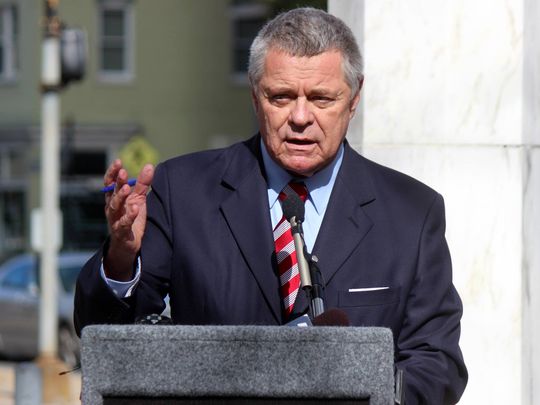
Local Colors, the Roanoke-based non-profit that promotes diversity, also helps welcome immigrants and refugees to the valley. It also sponsors outreach programs that bring different ethnic communities together.
So it’s not surprising that they would weigh in on the now-infamous remarks made in a public memo by Roanoke Mayor David Bowers – on official stationary from the mayor’s office.
Bowers made it all too clear that he opposed the resettlement of Syrian refugees in Roanoke until “all hostilities” in the area cease and the vetting process improves to weed out any potential terrorists who might slip through the cracks and wind up plotting attacks on the homeland.
It was the other part of Bowers’ memo that angered many more (some support his view on settling Syrian refugees) when he recalled the internment of Japanese-Americans from the West Coast to camps during World War II. The action, which was called for as a security measure by President Franklin D. Roosevelt, is now widely viewed as a shameful period in American history. That was the part of the memo that got national and international attention – and wide condemnation.
That memo also drew the ire of the other six City Council members, who during an extraordinary special meeting took turns forgiving Bowers and then scolding him for his views and/or for releasing those views on official stationary, making it look like they were also on board. Councilman Bill Bestpitch excoriated Bowers for cultivating a “lone wolf mentality” during his 24 years in office as a council member and mayor.
Local Colors executive director Beth Lutjen had lunch with some Syrian natives the day after Bowers released his statement. She says “everybody” understands the concerns over security after 9/11 and much more recently the Paris attacks, where several of the terrorists allegedly had Syrian connections. “We all feel this pain,” said Lutjen. For the local Syrians “it’s quite disturbing.” She notes that there is so much unrest and war there – and a possible breeding ground for ISIS terrorists.
The Syrians that have come to this area want the same thing others do, said Lutjen: “A better life for their children, they want freedom to live the way they see fit and to worship . . . the opportunity to prosper. All the things that we want.” Most of the Syrians here are immigrants, not refugees she notes, “delightful people” that love music, food and life in general.
Mayor Bowers reticence to accept more Syrian refugees – it should be noted that state and local governments may have little say over refugee resettlement – comes from a different perspective, said Lutjen. “I’m thankfully free of political ties. He has a different responsibility to the city. He has to do what he thinks is right,” said Lutjen.
Lutjen, who used to work for Refugee and Immigration Services, also points out that Syrian refugees “are not lining up” to resettle in the Roanoke area at this time.
“It’s not an imminent issue,” said Lutjen, “and it’s a long process to get people vetted.” That’s a point the federal government has also made – that the vetting process is thorough and detailed, often taking 18-24 months. “There’s concern about how that will be done – that needs to be ironed out, but that’s in the political [and] legal world. I’m sure Mayor Bowers has his concerns for the community and he has to exercise due diligence to protect the community,” said Lutjen.
By Gene Marrano


